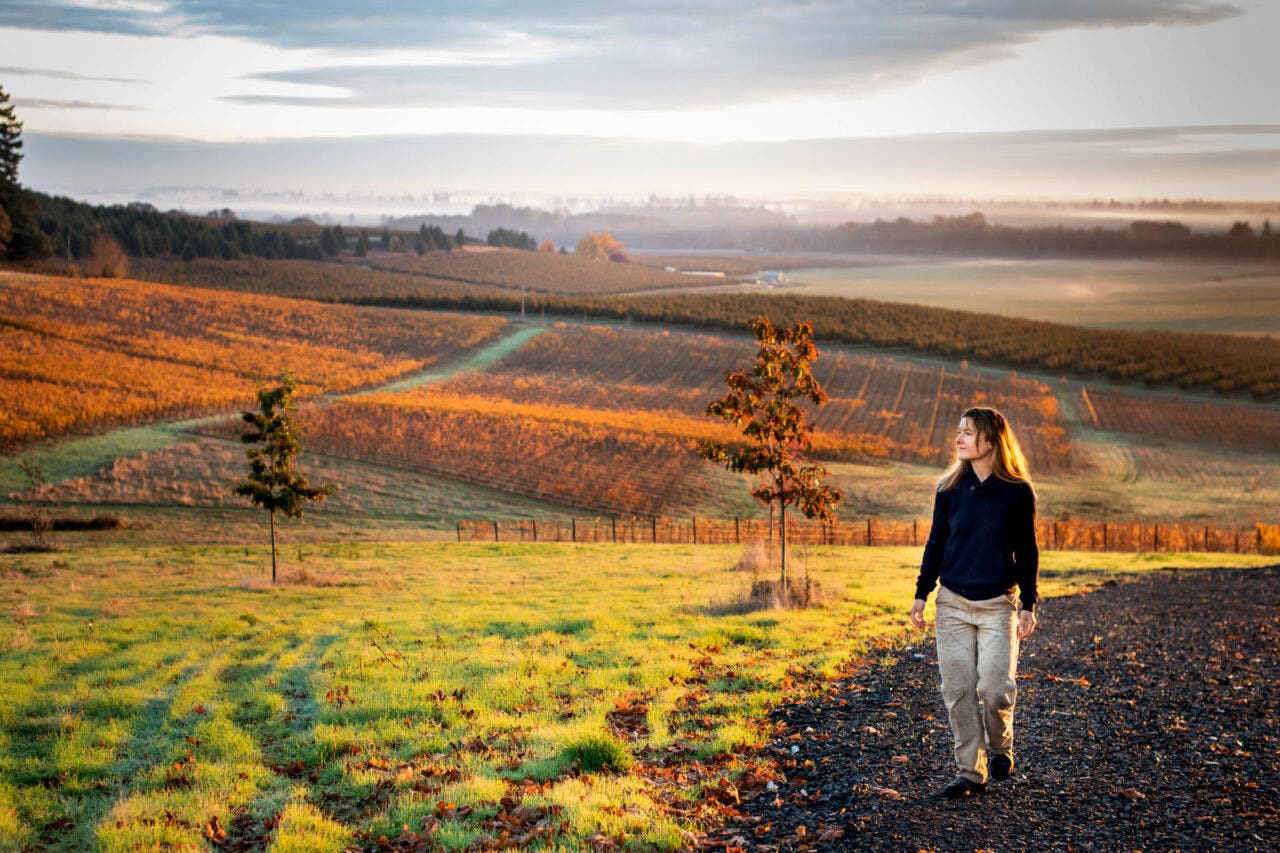Mimi Casteel is deeply rooted to Oregon’s Willamette Valley. She grew up at her parents’ trailblazing winery, Bethel Heights, in Eola-Amity Hills, and later stewarded the family vineyards to a more sustainable place. Today, Casteel tends her own vines on the site of a former Christmas tree farm just 10 miles from Bethel called Hope Well Wine.
While her small-batch Pinot Noir and Chardonnay have an avid fan base, it’s Casteel’s regenerative farming outside the winery that gets the most attention. With a background in forest ecology, botany and systems biology, Casteel is an authoritative advocate for a “no-till” farming approach that she believes has the power to combat climate change and undo decades of ecological damage. We recently caught up with Casteel to learn more about the many layers of farming regeneratively.

How does regenerative farming differ from other forms of sustainable viticulture?
I’ll say it the way I practice it, because all of these labels are pretty meaningless. It’s the philosophy behind them that’s what really matters. The way I practice farming is to look beyond the silos of sustainability that we’ve created, where either it’s about removing systemic [pesticides, which are absorbed into plants and distributed through their tissues] in organics, say, or focusing on teas in biodynamics. [Regenerative farming] is really about looking at an ecosystem upon which we are trying to impose an agricultural system and repairing the broken cycles of nutrient and energy flows by facilitating those flows from a functional, structural standpoint.
How do current farming practices, even those that might be sustainable, organic or otherwise, contribute to climate change?
Most forms of agriculture are contributing something in the way of emissions. But what often gets overlooked is the contribution of organic carbon. When we till the ground with discs, cultivators, plows or whatever implement used…the organic carbon that is stored both in the top layer of soil as organic matter and then deeper down in the soil as stronger carbon compounds, those get oxidized when they’re exposed to light and air.
If a conventionally tilled vineyard were to be converted to no-till farming, is there a period where the vineyard’s health and productivity might decline before improving?
Absolutely, and the operative word there is “might.” When we are repeatedly tilling, we are burning through our organic matter faster than we’re replenishing it because to replenish it, you have plant cover crops that then die back and create new organic matter and get cycled by the soil.
So, when you make the switch [to no-till farming], especially if you go cold turkey, your organic matter may initially be so low in establishing permanent [ground] cover that without establishing some kind of aggressive composting or similar, you would probably see some yield drops. The permanent cover would look like a competitive threat to your cash crop. I think that’s one of the major barriers to people converting.
“We are leaders in agriculture, and leading with our children and our grandchildren in our immediate minds is the only way I can think to participate as true stewards of the land.”
Why should viticulturists consider a regenerative, no-till approach to farming?
We are in a dire situation in some regions of the United States. [As viticulturists,] we could bring water back to the land through intentional agriculture. That’s going to require some immediate and short-term sacrifice for long-term gain. If we don’t do that then we’ve already written the end of viticulture in America, because it’s not necessary. We have to grow food, but we don’t have to drink wine. If those hard choices get put in front of us, I think that viticulture looks just like it is: a luxury product. But we are leaders in agriculture, and leading with our children and our grandchildren in our immediate minds is the only way I can think to participate as true stewards of the land.
Have you noticed a difference in wine quality since you started farming regeneratively?
This is, of course, a completely subjective answer, but yes, I definitely feel as though the wine quality here [at Hope Well] is a direct reflection of the improvements over time, and a return of a truly biological component of where we’re from.
Last Updated: May 8, 2023















